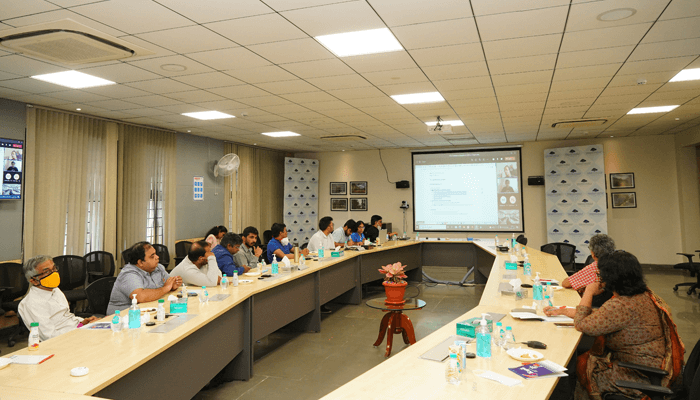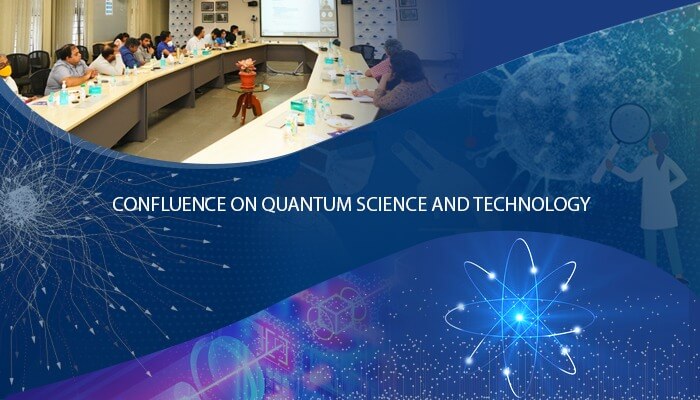As part of the R&D Showcase held in March, IIITH facilitated a roundtable discussion on Quantum Science and Technology to brainstorm on where we are at and the way forward in terms of Quantum technology. Here’s a brief summary of the collective reflections.
Until recently quantum research and technology was of interest only to theoreticians. However its ability to solve computational problems many times faster than ordinary computers has revealed the breakthroughs it can enable in a range of disciplines from medicine to space exploration. Globally, a quantum race is on over the development of this new-age tech. India formally joined this race in 2020 with the establishment of the National Mission for Quantum Technology and Applications (NM-QTA). With a lot of investment at stake, it is imperative to understand the current state of the Quantum ecosystem and its future possibilities. In March 2022, as part of the R&D Showcase at the International Institute of Information Technology Hyderabad (IIITH), a confluence session on quantum science and technology was held to deliberate upon the research directions, use cases and the opportunities to seed this futuristic technology.
Facilitated by Prof. Indranil Chakrabarty of IIITH, the panel saw a mix of industry veterans such as Mr. Rameshchandra B. Ketharaju from Wells Fargo, QECTI, Ms. Reena Dayal Yadav, CEO, Benzaiten Advisors, QECTI, Dr. Madhav Pulipati, CEO, Photonics Valley Corporation, Mr, Alok, from GS, Mr. Sathaye Nanad from Optum, Mr. Krishnakumar Sabapathy and Mr. Sesha Raghunathan from IBM, Mr. Krishna from Lightmotif Automotives, and faculty from IIITH such as Prof. Harjinder Singh, Prof. Samyadeb Bhattacharya, Prof. Subhadip Mitra, Prof. Shantanav Chakraborty and Prof. Siddhartha Das.

Research Directions
In a bid to understand where we are headed, discussions about the wide-ranging applications of quantum technology were held. We know that it can be used in just about everything from finance to healthcare to quantum chemistry. As newer research emerges, capabilities and understanding of the algorithms behind it simultaneously evolve too, thus expanding the applications of quantum technology. But in order to use the technology across domains, large-scale quantum computation needs to be achieved. This is possible only when the ecosystem grows in conjunction with the hardware and software working closely together. There was a consensus that quantum communication, security, quantum computing, error correction, and fault tolerance will play a key role in the scalability of quantum computers. In addition to this, it was felt that investment in areas like siliconization, quantum cryptography and security would provide a stronger foundation for quantum technology in the future.
Where We Would Like To Be
A collaboration between industry and academia is important for innovation and development of any technology. Quantum tech is no different. But in the case of the latter, an understanding of the unique use cases of quantum computing such as quantum networks, the quantum internet, and quantum cryptography helps in a better industry-academia partnership. The development of a robust quantum ecosystem accelerates skill development as well as algorithmic research for those interested in pursuing it. The conclave however suggested that for more industry-academic synergy, academic institutes ought to think beyond mere coursework. The skillsets required for this domain ought to be taught from the undergraduate years in a systematic manner. As a nation, since we are not yet close to a scalable quantum computer today, the industry should adopt a device-agnostic approach and help in building a common open source platform that will in turn identify new use cases.
Impact
IIITH has proposed to consider building technology solutions based on the use cases mentioned specially in the domains of finance and the health care sector. With Quantum technology witnessing a strategic shift in the last decade, the emphasis lately is more on applied engineering research with equal strong hold on basic sciences and fundamental research. It was reiterated that more collaboration between industry and academia can pave a path for the future of Quantum technology in India.



Next post